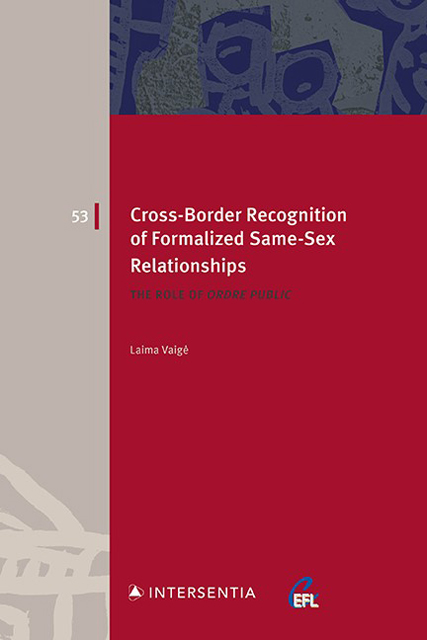Book contents
- Frontmatter
- Preface
- Contents
- List of Abbreviations
- Special Terminology
- List of Legislation and Other Instruments
- List of Cases
- Part I Setting the Stage
- Part II The Ordre Public in the Baltic States and Poland
- Part III The European and the EU Ordre Public
- Part IV Legal Effects of Formalized Same-Sex Relationships: National and Supranational Law
- Part V Law in Context
- Bibliography
- Index
- About the Author
- European Family Law Series
Chapter 14 - Conclusions
Published online by Cambridge University Press: 20 April 2023
- Frontmatter
- Preface
- Contents
- List of Abbreviations
- Special Terminology
- List of Legislation and Other Instruments
- List of Cases
- Part I Setting the Stage
- Part II The Ordre Public in the Baltic States and Poland
- Part III The European and the EU Ordre Public
- Part IV Legal Effects of Formalized Same-Sex Relationships: National and Supranational Law
- Part V Law in Context
- Bibliography
- Index
- About the Author
- European Family Law Series
Summary
Cross-Border Recognition of Formalized Same-Sex Relationships: Choice-of-Law Method Remains Relevant
Substantive family laws of European States have undergone changes over the last 30 years. A new institute of registered partnership has emerged and marriage has become available to couples of the same sex. Private international law is well-suited for negotiating and balancing the old with the new, and the local with the foreign. The issue of cross-border validity of a same-sex marriage or registered partnership is usually approached under the forum’s choice-of-law rules on validity of marriage or registered partnership.
It is desirable to take into consideration the development of substantive laws of the forum State, while designing its choice-of-law rules. As a result of changes in the forum’s substantive family law, its private international law may also change. That does not mean that private international law rules should mirror substantive family law of the forum and permit only the recognition of marriages which could also have been concluded in the forum State. Such an approach would render private international law devoid of its purpose to accommodate the foreignness.
Private international law is designed to accommodate the laws of another State closely linked to the situation, e.g., a marriage to be concluded or already concluded. Choice-of-law rules allow application of foreign law in respect of marriages to be concluded or already concluded abroad, based on either the principle of personal law, or on the principle of territoriality.
It appears that in the long term, it would be of practical significance to gradually decrease the plurality of connecting factors that determine the law applicable to substantive validity of marriages and registered partnerships already concluded abroad. Decreasing these factors would, at least, be possible on a European Union level. It would contribute to increased legal certainty not only for the individuals involved, but also from the point of view of the Member States which allow or do not allow same-sex marriages, as well as from the point of view of the European Union promoting free movement of individuals and prohibiting discrimination.
Any specific private international law solution on substantive validity of marriage or registered partnership is currently up to the EU Member States as well as State parties to ECHR.
- Type
- Chapter
- Information
- Cross-Border Recognition of Formalized Same-Sex RelationshipsThe Role of <i>Ordre Public</i>, pp. 425 - 436Publisher: IntersentiaPrint publication year: 2022

